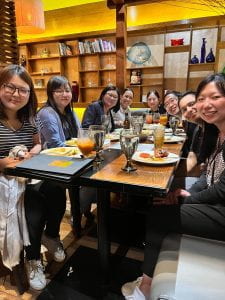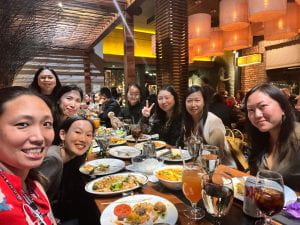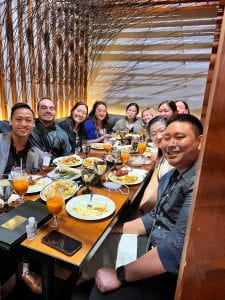Dear REAPA Family,
What an honor it has been to chair the American Education Research Association (AERA) Research on the Education of Asian Pacific Americans (REAPA) Special Interest Group (SIG) over the last two years. When I first stumbled into a REAPA business meeting several years ago (because Jung Kim told me I should go and I always listen to what Jung tells me), I doubted my own right to be there or to take up space anywhere, quite frankly.
Was it okay to be in a space that focused on the Education of Asian Pacific Americans just because I was Asian American? My research at the time focused on teacher identity more broadly and while it touched on teacher candidates of color, I hadn’t ever felt like I could be someone who did research focused on Asian Americans.
And how legitimately Asian American was I? I didn’t speak my heritage language. I was brought up internalizing assimilation mentalities that my mother adopted because she thought that would make my life better and easier. Her teachings that I should be quiet, keep my head down, work hard, and wait to be recognized, were what I held onto from her, a legacy of sorts, in the many years since she had passed, and I worried that unlearning those lessons who be dishonoring her.
But, somehow, despite all of these insecurities, Liza Talusan convinced me to run for chair of the SIG even though I had no idea what that meant and even though I was secretly cheering on the other candidate for the position. There was a cool Asian American research(er) club, and I certainly did not feel like I was in it.
Then I won.
In the meantime, I had begun a journey of learning and unlearning, of thinking and researching that began with myself. I started a degree in Chinese studies in an effort to reclaim my heritage language (which I stopped just pre-pandemic, but I’m still learning with my trusty friend, Duolingo). I began collaborative autoethnographic work to excavate through critical intersectional lenses the way that who I was shaped my experiences in (teacher) education. Jung and I conducted a national study of Asian American teachers that ended up being published in my first research monograph. We co-authored work on losing and reclaiming our heritage languages with my son. I began to take new things from my mother’s legacy: her strength and survival; her solidarity with other women of color at her work; her resilience to raise me on her own.
Then the COVID-19 pandemic stopped the world. Asian (Americans) became the target of widely publicized scapegoating, racially based hatred and violent attacks. I was reminded that no matter how American I felt, there would always be people who denied my right to my own define myself, that there would always be people telling me to go back to my own country, that there would always be people who would compliment me on my English with the assumption that it wasn’t my first language, that there would always that always be people would blame me for sickness, economic decline, their children not getting into their first choice college, etc.
Then Atlanta happened. Asian (American) women were brutally killed and tried in courts of public opinion for working in the spa industry. We were told this was not a hate crime, that a (white) man’s sexual desires and desire to cleanse himself from them were heinous, but not hateful.
People tried to release solidarity statements, to stand with Asian Americans in this time of hate and violence, but the burden all too often fell to Asian Americans, because, except for those of us who have engaged in auto-didactic study or had access to ethnic studies programs, so few people understand our histories and the complexities of our communities.
Even I am always learning. People continue to call me in gently and remind me of my blindspots.
There are so many complexities within our Asian American family, between Asian Americans and other communities of color, in relation to our intersectional identities. There are still Asian Americans who like I felt in that first REAPA meeting, often feel on the margins even (or especially) within Asian American spaces. There is still a deep need for fem/mentorship, for research that focuses on Asian Americans at all levels and in all roles in education, for our embrace of ourselves and one another, for solidarity.
My hope for my time as REAPA SIG chair has been to bring us together as family and community, to help us embrace our humanity, to help each member to feel like they/you belong, and to reach out beyond the SIG to remind others that they can belong too, that indeed, we belong to each other, that what you research matters less than who you are, that we are in this together.
As my time ends as REAPA chair, I just want to say thank you to each of you and all of you, to the membership who elected me, for your trust in me to lead, for those who joined while I was chair, for showing up and showing out or for your silent support as our journeys intersected. I know the work will continue on powerfully, productively and in community with the continuing leadership team under our new chair, Grace (Jia) Liang, and the leadership team. Please support Grace in her leadership as you’ve been so generous with me.
I love you all. I’ll still be around if you need anything, and I will be forever grateful for this time with this beautiful and brilliant group of people. Thank you all so much for this opportunity.



